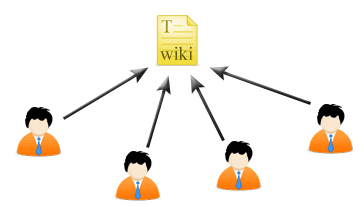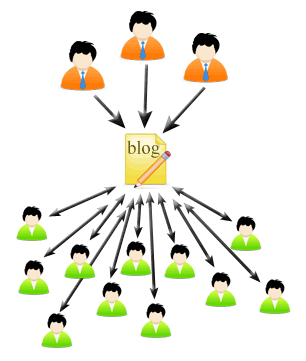Difference between revisions of "Blogs vs. Wikis"
Caseorganic (Talk | contribs) |
Caseorganic (Talk | contribs) |
||
| Line 22: | Line 22: | ||
{{clear}} | {{clear}} | ||
| − | [[ | + | [[image:aaron-parecki-what-are-wikis.gif|thumb|200px|right|Illustration of Collaboration on a Wiki by [[Aaron Parecki]]]] |
| + | [[image:aaron-parecki-what-are-blogs.gif|thumb|250px|left|Illustration of Collaboration on a Blog by [[Aaron Parecki]]]] | ||
*They're easy to learn and use. Wikis aren't as complicated as other types of content management systems. | *They're easy to learn and use. Wikis aren't as complicated as other types of content management systems. | ||
Revision as of 04:18, 23 September 2012
Definition
"WikiWikiWeb is a term that has been used to refer to four things: the first wiki, or user-editable website, launched in 25 March 1995 by Ward Cunningham as part of the Portland Pattern Repository (the website was also later known as "WardsWiki"); the Perl-based application that was used to run it, also developed by Cunningham, which was the first wiki software (it was later renamed "WikiBase"); the original general term for wikis; and the original term for wiki software" WikiWikiWeb.
Differences Between Blogs and Wikis
On a blog there is glut, on a wiki you curate.
Why use a wiki?
A wiki lets you and your teammates collaborate online. It's easy, efficient, and intuitive to use. Every user gets a voice and everyone's contribution is seen, heard, and can be commented upon. In this way wikis improve and democratize communication -- no one misses the 'memo' and anyone can send it. Wikis get information to the right people -- important information (documentation, processes, ideas, communication, etc.) is available to the people who need it, not locked and buried in one person's in-box.
- Wikis make it easy to keep all your information current and accurate.
- Information stored in wikis is dynamic. With wikis, anyone can edit a page (however, with Confluence, administrators can control view, editing, and content privileges) so content is current.
- Wikis keep your information safe. It's virtually impossible to lose information. You can view changes made by different users or rollback to previous versions.
- Even as members of your team turn over and new employees are hired, the wiki can be an unbroken repository of knowledge that evolves with your growing organisation.[1]
What In The World Is A Wiki?
"Wiki.org defines wiki as "the simplest online database that could possibly work." Inspired by Apple's HyperCard programming environment, the first wiki software was created in 1995 by Ward Cunningham as a way to manage the Portland Pattern Repository's site content. Named after wiki-wiki, the Hawaiian word for quick, wikis are essentially Web pages that anyone — or at least anyone with permission — can create or edit".
"The most well-known example of a wiki is Wikipedia, an online encyclopedia that is written and maintained by, well, anybody who feels like it. Sound like utter chaos? Not so. It's a well-researched, well-written, and highly regarded source of information. If one person makes incorrect or inappropriate changes to an entry, others can roll the page back to the way it was before, or keep the changes and edit them further. Thousands of people police the site (or at least those areas in which they have expertise), fact-checking and editing as necessary, so the quality of the content generally remains high"[2]
What's so great about wikis anyway?
Wikis are simple, efficient tools for managing knowledge and collaborating. They're particularly convenient in today's busy and international workplace.


- They're easy to learn and use. Wikis aren't as complicated as other types of content management systems.
- With wikis, knowledge doesn't get buried in emails, locked into file systems, hard drives or servers, intranets or extranets, or closed in more specialised data management systems and knowledge management systems.
- Wikis are online so users can access, collaborate on, and share content, knowledge and files anytime, anywhere.
- Wikis are also exceptionally flexible. You can customise them and also connect a wiki to other applications, databases, and file systems. And, most wikis are a fraction of the cost of most enterprise software".[3]
How To Use Wikis For Business
Content management systems will always have their place in the publishing world, but they've never been the best tools for business collaboration. A simple open-source app called the wiki may soon rule the knowledge management roost.
Wiki
"A wiki is a website where users can add, remove, and edit every page using a web browser. It's so terrifically easy for people to jump in and revise pages that wikis are becoming known as the tool of choice for large, multiple-participant projects".[4]
Video Introduction to Wikis
A short introduction to wikis that illustrates how they can be used to organize a group's information, in this case, for a camping trip. Release Date: 5/29/2007. Video Length: 3:34.
References
- ↑ http://www.atlassian.com/software/confluence/wiki.jsp
- ↑ http://www.informationweek.com/news/global-cio/showArticle.jhtml?articleID=167600331 By Ezra Goodnoe, InternetWeek August 8, 2005 08:00 AM.
- ↑ http://www.atlassian.com/software/confluence/wiki.jsp]
- ↑ http://www.oreillynet.com/pub/a/network/2006/07/07/what-is-a-wiki.html What Is a Wiki (and How to Use One for Your Projects) by Tom Stafford, Matt Webb 07/07/2006.